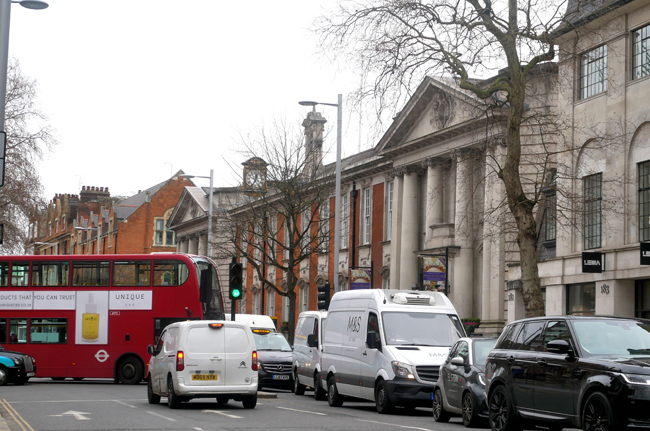London mayor Sadiq Khan has warned that the capital ‘could move from one public health and economy crisis to another’ as City Hall put the cost of congestion in the city at over £5bn a year.
The mayor’s office said public transport ridership is still significantly behind pre-pandemic levels, with buses at 70% of normal demand and Tubes at 55%. However, car use has been more resilient, with data showing it has been close to pre-pandemic levels for much of the latter half of 2021.

Traffic in London, March 2021
The overall ‘active, efficient and sustainable’ mode share for travel in 2020 - the number of trips by walking, cycling and public transport as a proportion of all trips and the key metric the mayor is trying to increase as part of his transport strategy – is estimated at 58.3%, down 5% from 63.2% in 2019.
Officials said this reduction is a result of a 14% drop in the share of trips made by public transport, which offsets a substantial increase witnessed in the share of trips made by walking or cycling – up 9% in 2020.
City Hall said data from external providers shows that as the number of vehicle miles has increased, so too has the time lost by drivers to traffic. INRIX data shows 148 hours lost a year by drivers on average in 2021, estimated to cost the economy £5.1bn a year, or £1,211 per driver, based on an estimate of the average value of earnings that drivers could be making, or the leisure time they could be enjoying, if they were not stuck in traffic
Officials added that this comes alongside significant health impacts, including increased risk of respiratory diseases, and children growing up with stunted lungs.
Mr Khan said: ‘If we do not double down on our efforts to deliver a greener, more sustainable future we will replace one public health crisis with another – caused by filthy air and gridlocked roads.
‘Most traffic is caused simply by there being too great a demand for limited street space, meaning the only long-term solution can be to significantly reduce car use in favour of greener means of travel.’
Alex Williams, TfL's director of city planning, said: ‘Following the successful expansion of the ULEZ scheme, which led to a reduction in trips by older and dirtier vehicles, we’re determined to make sure that clean and reliable public transport plays a central role in supporting Londoners and the wider economy.’
Register now for full access
Register just once to get unrestricted, real-time coverage of the issues and challenges facing UK transport and highways engineers.
Full website content includes the latest news, exclusive commentary from leading industry figures and detailed topical analysis of the highways, transportation, environment and place-shaping sectors.
Use the link below to register your details for full, free access.
Already a registered? Login